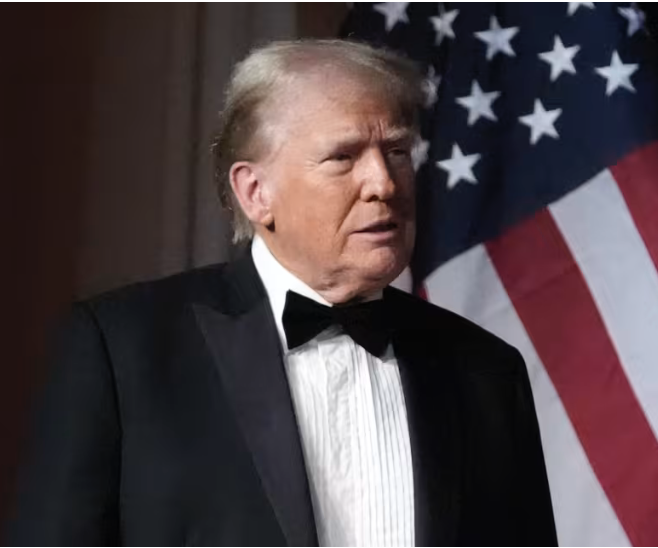Bureaucracies kept winning because no one paid attention to them. Until now.
It is no wonder that Donald Trump said at his postelection Mar-a-Lago gala: “You have to start my term from Nov. 5, OK?” Mr. Trump knows the clock is ticking on his final term. His No. 1 second-term goal is to disrupt and dismantle Washington’s inbred status quo. Welcome to America’s longest-running war, Mr. President-elect. Glad to have you join us in the trenches.
As we wrote in this space some time ago, the Journal’s editorial writers popularized the phrase “inside the Beltway” in the 1980s to describe “the moatlike highway around the nation’s capital, whose inhabitants had become politically and psychologically isolated from the rest of the country.” The Beltway remains impregnable.
In 1994, Newt Gingrich’s Contract With America promised “a Congress that respects the values and shares the faith of the American family.” Bill Clintondeclared in his 1996 State of the Union, “The era of big government is over.”
Thirty wheel-spinning years later, what are Mr. Trump’s chances?
Divining what exactly is on Mr. Trump’s mind is a fool’s game. It seems clear the essential criterion for nomination to the Trump cabinet is relentless, televised assertions of loyalty to him personally. Alexander Hamilton in Federalist No. 76 warned the Senate against confirming a president’s nominees who would be “the obsequious instruments of his pleasure.”
Let’s not deny that obsequiousness fills the air just now. But also everywhere in our time is bureaucratic betrayal of the American people, whether undermining any conservative president’s policy goals or deploying the FBI against the last one. If the obsequious succeed in corralling Washington, few will complain.
Matt Gaetz has become the poster boy for pliant assent to Mr. Trump’s will. The former Florida congressman’s nomination to be attorney general has devolved into questions about his moral fitness and a fight over releasing the House Ethics Committee’s report on Mr. Gaetz.
Defenders of Mr. Gaetz say he’ll smash the lawfare bureaucracies at the Justice Department and the FBI. Elon Musks call him the “Judge Dredd America needs to clean up a corrupt system.”
The fitness issue matters but is a distraction from whether Mr. Gaetz is the right choice. The more pertinent question is whether he would in fact succeed at making good on the Trump Beltway reforms.
Bluntly, if the Gaetz confirmation vote were held in the House, he’d fail because so many Republicans abhor him personally, not least because of his role in the pointless nationally televised spectacle that ran Kevin McCarthy out of the speakership.
In Washington, functional relationships matter, and Mr. Gaetz has almost none. Hold the screams about establishment sellouts. Since ancient Athens, success in achieving political goals has depended on personal relationships. Washington, like it or not, is about politics.
In this respect, Donald Trump and Matt Gaetz couldn’t be less alike. Mr. Trump is a relationship guy. He maneuvers people inside his deals. Mr. Gaetz does the opposite. He makes people not want to do business with him. As attorney general, he would fail, and the Comey-Holder legacy would survive.
Other nominees share Mr. Trump’s intention to force the federal bureaucracies to rediscover that private markets, not they, make the U.S. economy function. It’s fair to say Mr. Trump’s cabinet is a herd of bulls in a china shop, but these nominees also know from experience that it’s faster to walk around a floor strewn with broken crockery than right over it.
Doug Burgum, the North Dakota governor heading to the Interior Department, did endless deals to succeed in business and politics. Mr. Trump’s EPA administrator, Lee Zeldin, an unstinting conservative advocate, has decent relationships with his home-state New York Democrats. Chris Wright, the nominee to head the Energy Department, couldn’t have succeeded in the tough world of natural-gas fracking without persistence and relationship skills.
Two nominees less likely to reform Washington on its current course are Robert F. Kennedy Jr. at Health and Human Services and Pete Hegseth at Defense.
RFK Jr.’s targets are a) Big Food, b) Big Pharma, c) eliminating fluoride in water, d) the Food and Drug Administration, e) the National Institutes of Health and f) the Centers for Disease Control and Prevention. These agencies need reform, but his impossibly sprawling agenda risks bogging down in battles over scientific arcana such as food colorings. RFK Jr. will elevate discussion of some interesting controversies but possibly not much else.
Mr. Hegseth was airlifted from his weekend hosting job on Fox News to be defense secretary. The Pentagon is the greatest policy labyrinth in all history. Its “woke” problem can be solved overnight with a presidential directive. But if Mr. Trump is serious about rebuilding the U.S. military—which isn’t entirely clear to me—he needs a second-term secretary who knows the terrain at least as well as the Defense Department’s bureaucrats. There will be no heavier lift.
A reason these bureaucracies get away with so much is that so little sunlight reaches them. Notwithstanding recent concerns about “our democracy,” few reporters volunteer to build a career covering unglamorous federal agencies. It’s no surprise that, untended, Washington degraded into a swamp. Mr. Trump seems serious about pulling the plug. Like everything else about his presidency, we’ll see.
To see this article in its entirety and to subscribe to others like it, please choose to read more.
 Listen Online
Listen Online Watch Online
Watch Online Find a Station in Your Area
Find a Station in Your Area









 Listen Now
Listen Now Watch Online
Watch Online
